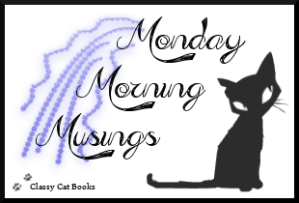Monday Morning Musings: 2014 Publisher Predictions – Part 2
Monday Morning Musings is a themed post I share approximately weekly. Every Monday, I will share my thoughts on something related to the book industry, be it publishing, blogging, economics, or some other related topic. Feel free to join in with posts of your own and link back here, or just have some open discussion in the comments.
The current series of topics for Monday Morning Musings are in response to this article, written in January 2014. Basically, it’s about predictions that the book publishing industry made for the book market over the course of this year. Now that we’re roughly 3 quarters through, I though it might be interesting to give my perspective on the status of those predictions. This will take place over 7 posts (2 topics each)—since there’s so much content, this post would go on forever if I tried to do it all in one!
Please weigh in with comments or related posts!
Previous Topics:
This Week:
- Ebook growth slows:
Summary of article comments:
In really condensed form, the article indicates that the market is done growing at rapid rates. More specifically, we’ve been sustaining a market that more than doubles every year, and that kind of growth simply isn’t sustainable. It also indicates that we are reaching the point when business models can actually be tested: rapid growth disguises data and leads to the potential to misinterpret trends, and it isn’t until that growth slows that one can really understand the actual cause and effect.
My thoughts:
Upon an initial read, without any look at the data, I must say that I completely agree with the sentiment of this article. As with all new markets, we will absolutely see a boom and then a plateau. Are we at the plateau yet? We’ll see in the next paragraph. Is it possible to test some theories during the boom in preparation for the plateau? I would argue that there are certain things you can look at in your data to prepare for that plateau if you have the right kind of data, and you know what you’re looking for.
First up: did we see a plateau hit in 2014? Or at least the first signs of one?
Well, first let’s start by pointing out that the sales of Kindles has already plateaued — this is expected, and it will naturally have an influence on our data. According to Trefis, a market stock analysis company that built a model to predict trends in Amazon sales based on historical data, Kindle sales largely plateaued in 2012.
So now that we’re armed with some necessary background information, we have a pretty good indication of what we’ll expect to see on ebook sales. I’m guessing that they will also have plateaued somewhat. However, we need to understand that just because people aren’t still buying ebook readers like crazy doesn’t mean they aren’t still buying ebooks like crazy. I’d expect there to be some correlation, but not necessarily a perfect one. I mean, it’s really the people who like shiny new toys but later forget about them that will drive that correlation, not us dedicated readers, some of whom probably buy (or even grab freebie copies of) ebooks daily or weekly.
As for what we’ve actually seen on ebook sales this year, I must say I’ve had a hard time finding any actual data. Most of the information I’ve found is 2008-2010, 2009-2011, or 2010-2013. I did find one article that indicated that the ebook plateau actually hit last year, but I have no idea where their data came from, so I’m not going to share it here. I may have to follow-up on this post when 2014 financial statements come available next year.
As for being able to predict the quality of your business plan and the assumptions you’re making (assuming you’re a publisher): There’s a certain amount of assumptions that can be understood and controlled for through the use of a simple time series analysis. You can control for growth behaviors by looking at data from similar market introductions (online music downloads; video; hell, even the introduction of the paperback novel) and make inferences. Will they be perfect? No, but an estimate never will be. If you have proper controls in your model, you can make some reasonable assumptions about other cause and effect relationships you’re trying to actually understand. Yes, they will become more known and better understood when you’re not having to manipulate your data to normalize for such influences, but that doesn’t mean to just stand by and wait for it to happen before developing your business model.
- Competition increases dramatically:
Summary of article comments:
In short, the ebook market will become more competitive with competition in the market increasing by an order of magnitude. In 2013 the playing field leveled a bit, but the flexibility enjoyed by indie publishers (such as being allowed to offer low-price offers to gain initial market share) will still keep the larger publishers on their toes.
My thoughts:
Initially I feel that this article made a lot of assumptions about market competitiveness in the past. It states that Indie publishers have previously had the “favor” of the ebook publishing market. I’m not so sure that I agree with this, depending on your definition of “market share.” That said, let’s set a definition for the purposes of this discussion.
Here’s what Investopedia has to say about “Market Share”:
The percentage of an industry or market’s total sales that is earned by a particular company over a specified time period. Market share is calculated by taking the company’s sales over the period and dividing it by the total sales of the industry over the same period. This metric is used to give a general idea of the size of a company to its market and its competitors.
So, say Company A is a publishing company in the ebook industry. Say that the ebook industry is a $1M market, and that Company A earns $250K of that revenue. Company A’s market share would therefore be $250,000 / $1,000,000 = 25%. This kind of metric is used in the US by the Federal Trade Commission (FTC) in order to assess the potential for a monopoly/oligopoly, and if a particular merger or acquisition will result in a sufficiently high market share, the FTC will not allow said merger or acquisition.
The point is, market share is calculated by company. I’m sure that if you aggregated all of the indie publishers into one pool and ran this calculation, they might have had a good sized chunk of market share in the ebook market relative to the print market. See that relative clause? It’s not as if the major publishing warehouses were particularly weak in the ebook industry — they certainly came on board quickly and with a vengeance. But the indie authors/publishers had less of a disadvantage in the ebook market than they had in the print market, with fewer setup costs (place to print, warehouse to store stock, etc) than in the print market. So I’m sure that when comparing the ebook and print markets, indie publishers appeared to have an advantage over the traditional publishers.
I’m quite positive that I can’t speak to the impact of this in 2014 right now. There just doesn’t appear to be any data on this relatively available. I might try to do some digging through financial statements at some point, but that will only tell me about previous years, and only for publicly traded companies. Depending on what I dig up, I’ll share my thoughts in a separate post.
Upcoming Topics:
- Ebook sales, measured in dollar volume, will decrease in 2014
- Ebook unit market share will increase
- A larger wave of big-name authors will defect to indieville
- It’s all about the writing
- All authors become indie authors
- Subscription ebook services will change the game
- Traditional publishers will reevaluate their approach to self-publishing
- Author platform is king
- Multi-author collaborations will become more common
- Production takes on increased importance in 2014
Posted on September 15, 2014, in Monday Morning Musings and tagged ebooks, economics, market analysis, print books, publishers, publishing. Bookmark the permalink. 5 Comments.








We were eventually going to hit a ceiling if for no other reason than there are only so many readers and so many books bought a year. I kind of thought we hit it last year but I, for sure, don’t see much growth in 2015.
I tend to agree with you in that we’ve probably pretty well hit market saturation. I was a bit surprised the article was predicting it would happen in 2014 because I’d been under the impression we’d pretty much already hit it. I wish I could find some data to prove the point, though. I feel so much of what’s going on in this market right now is just based on hunches that can’t be/haven’t been proven or validated by data and trend analysis.
Awesome analytics! How long did you research your data?
You should probably check the kindle unlimited next, I hear indie authors aren’t quite happy about that because it’s shrinking their already meager revenue.
Thanks! Most of my research was just short and sweet for this post—I didn’t do as much digging as I would have liked, but I’ll probably follow this one up at some point with some more thorough research. Last week I spent a few hours looking up any kind of data I could find for bullets #1-2, and a lot of that carried over into this week’s info.
Great idea about the Kindle unlimited. I haven’t quite wrapped my head around how I think that will impact various aspects of the book market, but I do 100% believe it would negatively impact indie authors. I’ll have to go poking at the internets and see what I find 😉
And thanks for following!
Oh and I’m a new follower, thanks for stopping by my blog yesterday 🙂